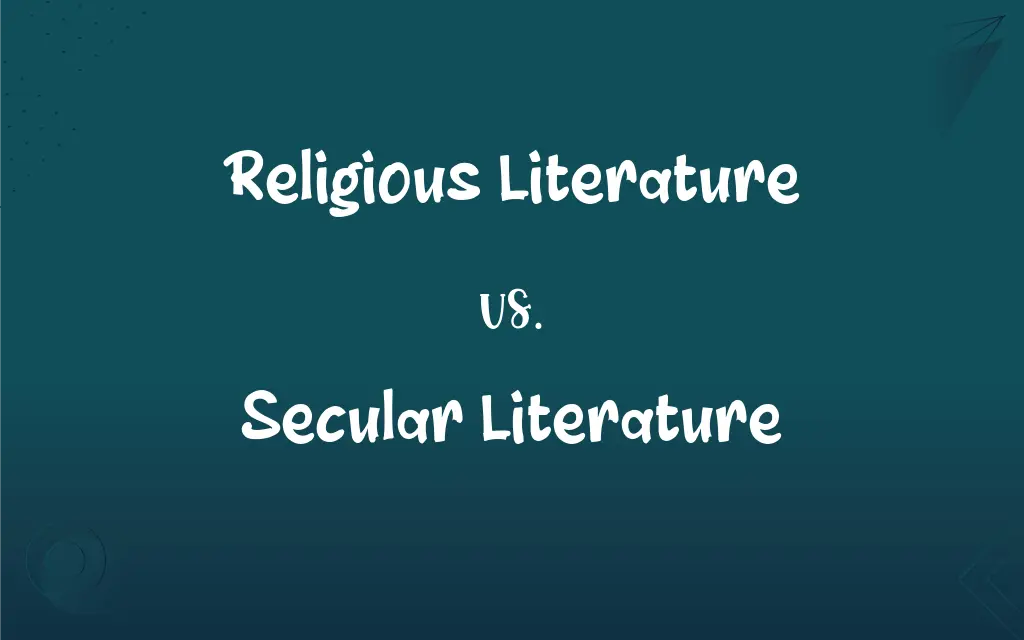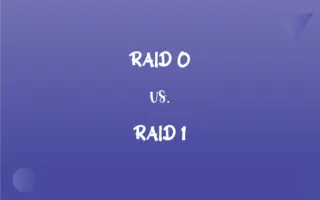Religious Literature vs. Secular Literature: What's the Difference?
Edited by Aimie Carlson || By Janet White || Published on January 30, 2024
Religious literature centers on spiritual beliefs, rituals, and moral guidance based on specific religions, whereas secular literature focuses on themes and stories unrelated to religious doctrines or practices.

Key Differences
Religious literature primarily explores themes of faith, spirituality, and divine teachings. Secular literature, in contrast, delves into worldly matters and human experiences unrelated to religion.
The purpose of religious literature is often to impart moral, ethical, and spiritual teachings. Secular literature aims to entertain, inform, or reflect on human conditions without a religious context.
Religious literature typically addresses believers or those interested in specific religious ideas. Secular literature appeals to a broader, more diverse audience without religious prerequisites.
Religious literature is deeply rooted in historical and cultural contexts of specific religions. Secular literature is influenced by a wide range of cultural, historical, and personal perspectives.
Religious literature often adopts a narrative style central to religious doctrines or parables. Secular literature encompasses a wide array of genres and styles, unrestricted by religious frameworks.
ADVERTISEMENT
Comparison Chart
Themes
Faith, spirituality, divine teachings
Worldly matters, human experiences
Purpose
Moral, ethical, spiritual teachings
Entertainment, information, human condition reflection
Audience
Believers, those interested in religious ideas
Broad, diverse audience
Contextual Influence
Historical, cultural contexts of specific religions
Wide cultural, historical, personal influences
Literary Style
Narrative styles aligned with religious doctrines
Varied genres, unrestricted by religious context
ADVERTISEMENT
Religious Literature and Secular Literature Definitions
Religious Literature
Sacred Texts.
The Bible is a central piece of Christian religious literature.
Secular Literature
Scientific Works.
Many scientific texts are examples of secular literature.
Religious Literature
Spiritual Narratives.
Many religious literature works contain stories of prophets and saints.
Secular Literature
Non-religious Poetry.
Secular literature includes poetry that explores love, nature, and human emotions.
Religious Literature
Doctrinal Teachings.
Religious literature often includes texts explaining religious doctrines.
Secular Literature
Historical Non-Religious Accounts.
Secular literature includes histories not focused on religious events or figures.
Religious Literature
Moral Parables.
Parables in religious literature are used to impart moral lessons.
Secular Literature
Cultural Narratives.
Secular literature often reflects the cultural diversity of societies.
Religious Literature
Historical Religious Accounts.
Religious literature sometimes narrates historical events from a religious perspective.
Secular Literature
Worldly Fiction.
Novels like '1984' represent secular literature focusing on societal themes.
FAQs
Are religious texts the only form of religious literature?
No, it includes a variety of forms like narratives, parables, and poems.
Can secular literature be moralistic?
Yes, it can offer moral perspectives without religious underpinnings.
What defines religious literature?
Literature centered on religious themes, teachings, and spirituality.
What is secular literature?
Literature that focuses on non-religious, worldly themes and human experiences.
Can religious literature be fictional?
Yes, it can include fictional narratives with religious themes.
Is secular literature influenced by religion?
It can be influenced by religious contexts but remains fundamentally non-religious.
Does secular literature reflect on societal issues?
Yes, often delving into social, political, and personal issues.
Does secular literature include any religious context?
Generally, it avoids religious themes, focusing on worldly matters.
Can secular literature be spiritual?
Yes, it can explore spirituality without aligning with a specific religion.
What genres does secular literature cover?
It spans across all genres, from fiction to non-fiction, without religious constraints.
Is religious literature only for believers?
Primarily, but it also attracts those interested in religious studies.
Do historical events feature in religious literature?
Yes, often narrated from a religious viewpoint.
How does audience differ for these two types of literature?
Religious literature targets believers or those exploring faith, while secular literature has a broader audience.
Can secular literature be philosophical?
Yes, it often explores philosophical ideas outside of religious contexts.
Are religious doctrines always present in religious literature?
Often, but not always; some works are more narrative or allegorical.
How do the styles of these literatures differ?
Religious literature often follows doctrinal narratives, while secular literature has diverse styles.
Can religious literature be educational?
Yes, it's often used for religious education and moral teaching.
Do both forms of literature have historical significance?
Yes, both reflect and influence historical and cultural contexts.
Are modern works of literature typically religious or secular?
Modern literature predominantly leans towards secular themes.
Is satire found in secular literature?
Yes, satire is a common element in secular works.
About Author
Written by
Janet WhiteJanet White has been an esteemed writer and blogger for Difference Wiki. Holding a Master's degree in Science and Medical Journalism from the prestigious Boston University, she has consistently demonstrated her expertise and passion for her field. When she's not immersed in her work, Janet relishes her time exercising, delving into a good book, and cherishing moments with friends and family.
Edited by
Aimie CarlsonAimie Carlson, holding a master's degree in English literature, is a fervent English language enthusiast. She lends her writing talents to Difference Wiki, a prominent website that specializes in comparisons, offering readers insightful analyses that both captivate and inform.
































































